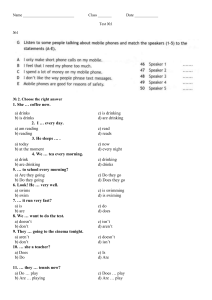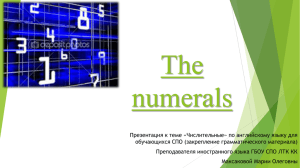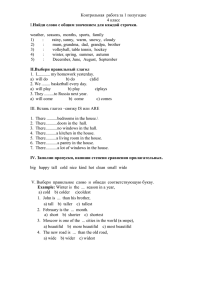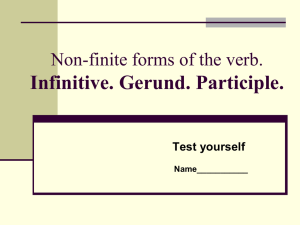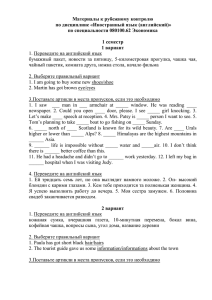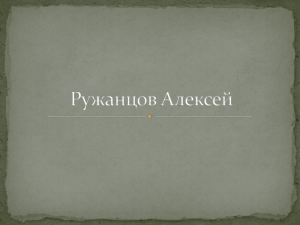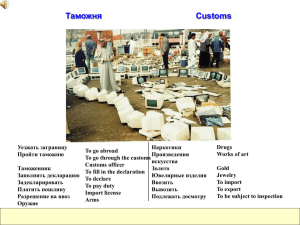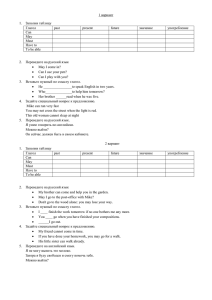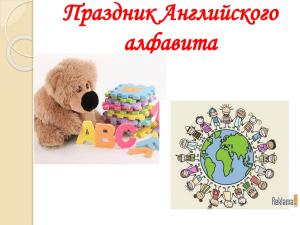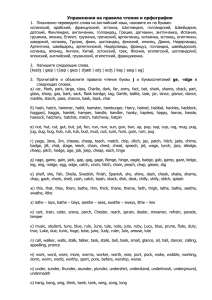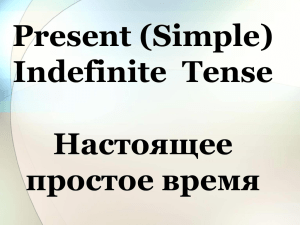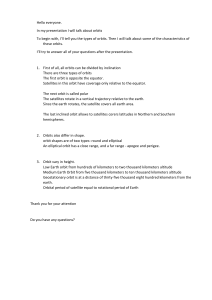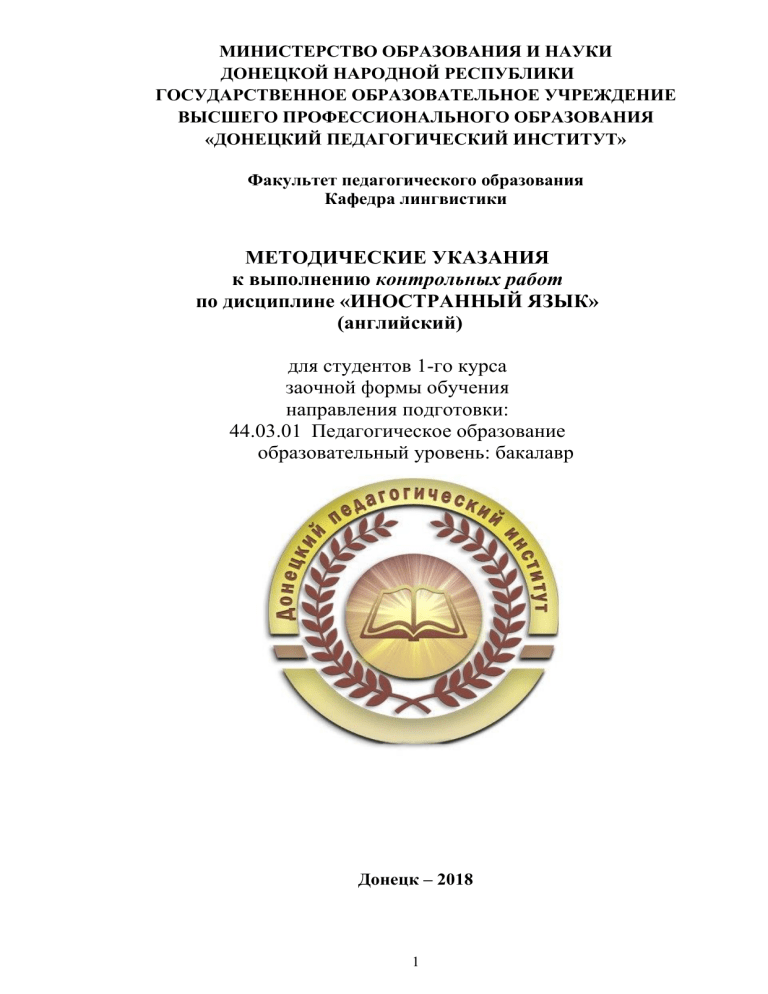
МИНИСТЕРСТВО ОБРАЗОВАНИЯ И НАУКИ ДОНЕЦКОЙ НАРОДНОЙ РЕСПУБЛИКИ ГОСУДАРСТВЕННОЕ ОБРАЗОВАТЕЛЬНОЕ УЧРЕЖДЕНИЕ ВЫСШЕГО ПРОФЕССИОНАЛЬНОГО ОБРАЗОВАНИЯ «ДОНЕЦКИЙ ПЕДАГОГИЧЕСКИЙ ИНСТИТУТ» Факультет педагогического образования Кафедра лингвистики МЕТОДИЧЕСКИЕ УКАЗАНИЯ к выполнению контрольных работ по дисциплине «ИНОСТРАННЫЙ ЯЗЫК» (английский) для студентов 1-го курса заочной формы обучения направления подготовки: 44.03.01 Педагогическое образование образовательный уровень: бакалавр Донецк – 2018 1 МИНИСТЕРСТВО ОБРАЗОВАНИЯ И НАУКИ ДОНЕЦКОЙ НАРОДНОЙ РЕСПУБЛИКИ ГОСУДАРСТВЕННОЕ ОБРАЗОВАТЕЛЬНОЕ УЧРЕЖДЕНИЕ ВЫСШЕГО ПРОФЕССИОНАЛЬНОГО ОБРАЗОВАНИЯ «ДОНЕЦКИЙ ПЕДАГОГИЧЕСКИЙ ИНСТИТУТ» Факультет педагогического образования Кафедра лингвистики МЕТОДИЧЕСКИЕ УКАЗАНИЯ к выполнению контрольных работ по дисциплине «ИНОСТРАННЫЙ ЯЗЫК» (английский) для студентов 1-го курса заочной формы обучения направления подготовки: 44.03.01 Педагогическое образование образовательный уровень: бакалавр УТВЕРЖДЕНО На заседании кафедры лингвистики Протокол № 7 от «27» февраля 2018 г. Донецк – 2018 2 Методические указания к выполнению контрольных работ по дисциплине «Иностранный язык» (английский) для студентов 1-го курса заочной формы обучения направления подготовки 44.03.01 Педагогическое образование образовательного уровня бакалавр / Составитель : А. В. Максименко. – Донецк, 2018. – 33 с. Методические указания предназначены для студентов 1-го курса с целью диагностики уровня сформированности англоязычных речевых навыков для их дальнейшего совершенствования и коррекции. Методические рекомендации составлены на кафедре лингвистики ГОУ ВПО «Донецкий педагогический институт». Составитель: старший преподаватель А.В. Максименко Рецензент: кандидат педагогических наук, доцент Я.В. Полякова © Донецкий педагогический институт, 2018 3 Содержание 1. Пояснительная записка....................................................................................... 2. Требования к оформлению контрольных работ............................................... 3. Варианты контрольной работы.......................................................................... 3.1. Контрольная работа №1 ................................................................................ 3.2. Контрольная работа №2 ................................................................................ 4. Критерии оценивания контрольных работ........................................................ 5. Литература............................................................................................................ 4 6 8 9 9 21 31 33 ПОЯСНИТЕЛЬНАЯ ЗАПИСКА Общая информация о дисциплине Наименование показателей Количество зачетных единиц – 10 Общее количество часов – 360. - для заочной формы обучения: аудиторных – 36 ч., самостоятельной работы студента – 324 ч. Область знаний, направление подготовки, квалификационный уровень Область знаний 44.00.00 Образование и педагогические науки Направление подготовки: 44.03.01 Педагогическое образование квалификационный уровень: бакалавр Характеристика учебной дисциплины заочная форма обучения Обязательная дисциплина социальногуманитарного цикла базовой части учебного плана Семестры I,II, III, IV Лекции Практические 8, 8, 10,10 ч. Вид контроля: I – зачет, к.р. II – зачет, к.р. III – зачет, к.р. IV – экзамен, к.р. Роль и место учебной дисциплины в учебном процессе Целью учебной дисциплины является получение студентами глубоких знаний по иностранному языку для их дальнейшего применения в своей практической деятельности в качестве сотрудников школ и дошкольных учреждений. В соответствии с поставленной целью курс решает следующие задач: в максимальной степени способствовать развитию умений использовать полученные знания в области педагогики; расширять активный вокабуляр студентов путем введения специальной профессиональной терминологии; развивать навыки работы студентов с текстовым материалом педагогического содержания; способствовать формированию у студентов навыков составления резюме и деловой документации; подготовить студентов к практическому использованию полученных теоретических знаний по грамматике английского языка. Требования к результатам освоения дисциплины В результате освоения учебной дисциплины студент должен знать: 1) значения новых лексических единиц, связанных с тематикой данного этапа и с соответствующими ситуациями общения; 2) языковой материал: идиоматические выражения, оценочную лексику, единицы речевого этикета, перечисленные в разделе «Языковой материал» и обслуживающие ситуации общения в рамках изучаемых тем; 5 3) новые значения изученных глагольных форм (видовременных, неличных), средства и способы выражения модальности; условия, предположения, причины, следствия, побуждения к действию; 4) лингвострановедческую, страноведческую и социокультурную информацию, расширенную за счет новой тематики и проблематики речевого общения; 5) тексты, построенные на языковом материале повседневного и профессионального общения. В результате освоения учебной дисциплины студент должен уметь: Говорение 1) вести диалог (диалог–расспрос, диалог–обмен мнениями/суждениями, диалог– побуждение к действию, этикетный диалог и их комбинации) в ситуациях официального и неофициального общения в бытовой, социокультурной и учебно-трудовой сферах, используя аргументацию, эмоционально-оценочные средства; 2) рассказывать, рассуждать в связи с изученной тематикой, проблематикой прочитанных/прослушанных текстов; описывать события, излагать факты, делать сообщения; 3) создавать словесный социокультурный портрет своей страны и страны/стран изучаемого языка на основе разнообразной страноведческой и культуроведческой информации; Аудирование 4) понимать относительно полно (общий смысл) высказывания на изучаемом иностранном языке в различных ситуациях общения; 5) понимать основное содержание аутентичных аудио- или видеотекстов познавательного характера на темы, предлагаемые в рамках курса, выборочно извлекать из них необходимую информацию; 6) оценивать важность/новизну информации, определять свое отношение к ней; Чтение 7) читать аутентичные тексты разных стилей (публицистические, художественные, научно-популярные и профессиональной направленности), используя основные виды чтения (ознакомительное, изучающее, просмотровое/поисковое) в зависимости от коммуникативной задачи; Письменная речь 8) описывать явления, события, излагать факты в письме личного и делового характера; 9) заполнять различные виды анкет, сообщать сведения о себе в форме, принятой в стране/странах изучаемого языка; 10) использовать приобретенные знания и умения в практической и профессиональной деятельности, повседневной жизни. Диагностика уровня сформированности англоязычных речевых навыков проводится с помощью контрольных работ, которые включают лексико-грамматические задания. Понимание лексических и грамматических единиц, а также синтаксических конструкций связного текста проверяется с помощью перевода отрывка текста с английского на русский язык. 6 ТРЕБОВАНИЯ К ОФОРМЛЕНИЮ КОНТРОЛЬНЫХ РАБОТ 1. Контрольная работа оформляется рукописно, разборчивым почерком в отдельной, тонкой тетради с пронумерованными страницами. 2. Титульная страница может быть выполнена в рукописном или в печатном виде следующим образом: МИНИСТЕРСТВО ОБРАЗОВАНИЯ И НАУКИ ДОНЕЦКОЙ НАРОДНОЙ РЕСПУБЛИКИ ГОУВПО «Донецкий педагогический институт» Факультет педагогического образования Кафедра лингвистики Контрольная работа по курсу «Иностранный язык» (английский) Вариант №7 Выполнил: Кононенко Алексей Сергеевич студент первого курса заочной формы обучения гр. З-НО-17/1 В Проверил: к.пед.н., доцент Парфёнов М. П. Оценка ___________ Подпись ___________ 3. Выполненную контрольную работу (тетрадь) необходимо сдать за 2 недели до начала зачетно-экзаменационной сессии. 4. Упражнения рекомендовано выполнять последовательно, начиная с первого. Необходимо переписать формулировки заданий и далее следует письменно выполнять упражнения: - для упражнений на перевод – без переписывания заданного текста. - для упражнений на раскрытие скобок/вставку пропущенного слова – переписывается только предложение с раскрытыми скобками/вставленным словом (слово, которое было в скобках/было пропущено, подчёркивается аккуратно карандашом). 7 ВАРИАНТЫ КОНТРОЛЬНЫХ РАБОТ Контрольная работа №1 Контрольная работа №1 выполняется в 1-м «Иностранный язык» (английский). Вариант 1 семестре изучения дисциплины 1. Translate the text. (Переведите текст) My name is Lavrova. I live in the centre of Donetsk. I work at the kindergarten №115. I’m a pre-school teacher and I’m also a student. Many teachers in our kindergarten learn foreign languages. I learn English at the Institute. We don’t write often in the class. Sometimes we have a dictation. During the lessons we read our text-books and do a lot of exercises. We don’t often speak Russian in the class. We speak English to our teacher. We usually speak Russian after classes. “What’s your family name?” “My name is Lavrova.” “And what’s your first name?” “My first name is Olga.” “Where are you from?” “I’m from Donetsk People’s Republic.” “What do you do?” “I’m pre-school teacher.” “Are you married or single?” “I’m divorced.” “Have you got any children?” “I’ve got two daughters.” “How old are they?” “They are twelve and sixteen years old.” 2. Put the questions to the words in bold in the text. (Поставьте вопросы к выделенным словам в тексте) E. x. My name is Lavrova. – What is your name? 3. Open the brackets, using the verbs in Present Simple. (Откройте скобки, употребляя глаголы в настоящем времени) E. x. He (to speak) English well. – He speaks English well. He __ (to get) up at 7 o’clock. He __ (to play) board games in the afternoon. Sometimes he __ (to swim) in the lake. He often __ (to go) hiking. Sometimes he __ (to sit) by the camp fire in the evening. 4. Put the words in the correct order. (Поставьте слова в правильном порядке) E. x. long / have / hair / You – You have long hair. 1) usually / we / shopping / at / weekend / the / go 2) goes / to / he / bed / sometimes / late 3) TV / watches / never / the / in / Samantha / morning 4) usually / l / dinner / eat / seven / at / past / half 5) his / dad / often / Tim / meets / after / school 5. Open the brackets, choosing the necessary degree of comparison of an adjective. (Раскройте скобки, употребляя необходимую степень сравнения прилагательного). E. x. He is one of the (good) students at school. – He is one of the best students at school. 1) She is (bad) pupil in their class. 2) Where is (near) polyclinic? 3) He speaks English (good) than I do. 4) My brother is three years (old) than I am. 5) My group-mates work (much) at Latin than I do. 8 6. Write down the following words in plural, like in example. (Напишите следующие слова во множественном числе) E. x. A cat – cats, a ball - … A star, a mountain, a tree, a waiter, the queen, a man, a woman, an eye, a shelf, a box. 7. Write the following numerals by numbers. (Напишите следующие числительные цифрами) E. x. Nine thousand four hundred thirty two - 9432 Nine thousand four hundred thirty two; two thousand nine hundred seventy one; the twentieth; five hundred sixty nine; seven thousand two hundred seventy nine. Контрольная работа №1 Вариант 2 1. Translate the text. (Переведите текст) My husband is an economist. He works at the Ministry of Foreign Trade. He goes to the office every day. My husband doesn’t learn English. He already knows English very well. He reads many English books, magazines and newspapers. Sometimes at the office he writes letters to the foreign firms. He often translates messages from English into Russian and from Russian into English. My husband is also a student. He studies German and is doing well. He usually gets good marks and is always in time for lessons. He likes languages very much and is going to study French next year. My husband and I usually go home together. We do our homework in the evening: we learn the new words, read the text and do exercises. We also revise grammar rules. We sometimes speak English at home. We speak about our work and our lessons. 2. Put the questions to the words in bold in the text. (Поставьте вопросы к выделенным словам в тексте) E. x. My name is Lavrova. – What is your name? 3. Open the brackets, using the verbs in Present Simple. (Откройте скобки, употребляя глаголы в настоящем времени) E. x. He (to speak) English well. – He speaks English well. My name’s Pavel. In the evening I usually __ (to do) my homework. Then I __ (to watch) TV or video. I __ (to like) action films! My sister is little. She doesn’t __ (to watch) action films. She __ (to like) cartoons. She __ (to watch) them every day. 4. Put the words in the correct order. (Поставьте слова в правильном порядке) E. x. long / have / hair / You – You have long hair. 1) office / work / They / in / at / an / London. 2) home / She / at / works 3 with / parents / lives / his / He 4) work / don't / hospital / a / I / in 5) goes / in / Chicago / He / to / university / the 5. Open the brackets, choosing the necessary degree of comparison of an adjective. (Раскройте скобки, употребляя необходимую степень сравнения прилагательного). E. x. He is one of the (good) students at school. – He is one of the best students at school. 9 1) I have (little) English books than Russian ones. 2) Who lives (far), you or your sister? 3) Is the station much (far)? 4) You’ll find the explanation (far) on. 5) Your record is (bad) than mine. 6. Write down the following words in plural, like in example. (Напишите следующие слова во множественном числе) E. x. A cat – cats, a ball - … A city, a boy, a goose, a watch, a mouse, a dress, a toy, a sheep, a tooth, a child. 7. Write the following numerals by numbers. (Напишите следующие числительные цифрами) E. x. Nine thousand four hundred thirty two - 9432 One hundred and twenty-three; four hundred and seven; three thousand five hundred and thirtyeight; seventy-three hundred and five; five million three hundred thousand and fifty. Контрольная работа №1 Вариант 3 1. Translate the text. (Переведите текст) My friend Petrov works at the office. He lives near the office. He usually walks here. He works here only five days a week. He works on Monday, Tuesday, Thursday, Friday and Saturday. His working day lasts eight hours. He receives many e-mails in the morning and always answers them. Sometimes he translates the articles from foreign newspapers and magazines. He usually finishes work at six o’clock in the evening. He has got a wife and two children. Petrov’s son is a little boy. I think he was born five or six years ago. His father takes him to a nursery school every morning. My friend’s got a sister. She’s going to be a doctor and she’s graduating from the Institute this year. She’s married. Her husband is an engineer. My friend’s wife usually takes the children to the country in summer to stay with their grandfather and grandmother. They love their grandchildren very much. She’s going to take them to the country again this summer. 2. Put the questions to the words in bold in the text. (Поставьте вопросы к выделенным словам в тексте) E. x. My name is Lavrova. – What is your name? 3. Open the brackets, using the verbs in Present Simple. (Откройте скобки, употребляя глаголы в настоящем времени) E. x. He (to speak) English well. – He speaks English well. We always __ (to celebrate) Christmas. My mum usually __ (to decorate) a Christmas tree. My granny often __ (to make) a cake. My parents sometimes __ (to send) Christmas cards. We never __ (to sing) Christmas carols. 4. Put the words in the correct order. (Поставьте слова в правильном порядке) E. x. long / have / hair / You – You have long hair. 1) usually / Mary / plays / games / the / computer / in / evening 2) Sally / do / and / Mike / shopping / the / Sunday / every 3) mum / Her / sometimes / a / DVD / watches 10 4) never / Children / to / go / bed / late 5) Our / drink / parents / morning / every / coffee 5. Open the brackets, choosing the necessary degree of comparison of an adjective. (Раскройте скобки, употребляя необходимую степень сравнения прилагательного). E. x. He is one of the (good) students at school. – He is one of the best students at school. 1) It’s the (little) of two evils. 2) She always dresses to the (late) fashion. 3) We have no (far) information. 4) Nick skates (good). 5) His (last) words were: “The end”. 6. Write down the following words in plural, like in example. (Напишите следующие слова во множественном числе) E. x. A cat – cats, a ball - … An ox, a deer, a life, a tomato. a company, the news, a glass, a library, a play, a note. 7. Write the following numerals by numbers. (Напишите следующие числительные цифрами) E. x. Nine thousand four hundred thirty two - 9432 One hundred and tenth; three thousand and fifth; one thousand two hundred thirty-four; twelve million three hundred forty thousand; six hundred fifty two thousand, six hundred sixty-five. Контрольная работа №1 Вариант 4 1. Translate the text. (Переведите текст) My friend’s name is Lavrov. He lives in Donetsk. His family is not very large. He has got a wife and two children. His wife’s name is Mary and his children’s name are Ann and Nick. Lavrov’s wife is a young woman. She’s twenty nine years old. She’s a lecturer. She teaches English at the Institute of Foreign Languages. She’s got many students. She had got bad students. Her students do well as a rule. My friend’s daughter is a girl of ten. She goes to school. She likes reading. She also helps her mother at home. He has got a wife and two children. Lavrov’s son is a little boy. I think he was born five or six years ago. His father takes him to a nursery school every morning. My friend’s got a sister. She’s going to be a doctor and she’s graduating from the Institute this year. She’s married. Her husband is an engineer. My friend’s wife usually takes the children to the country in summer to stay with their grandfather and grandmother. They love their grandchildren very much. She’s going to take them to the country again this summer. 2. Put the questions to the words in bold in the text. (Поставьте вопросы к выделенным словам в тексте) E. x. My name is Lavrova. – What is your name? 3. Open the brackets, using the verbs in Present Simple. (Откройте скобки, употребляя глаголы в настоящем времени) E. x. He (to speak) English well. – He speaks English well. I’m late again, it’s half past four. At five o’clock I __ (to drink) my tea, My lessons __ (to start) at ten to eight, But, poor me! I __ (to be) always late. 11 At ten to six I __ (to watch) TV. I __ (to go) to bed at ten to eight. To have a rest is always great! 4. Put the words in the correct order. (Поставьте слова в правильном порядке) E. x. long / have / hair / You – You have long hair. 1) Sundays / He / goes / on / often / to / park / the 2) She / late / is / never 3) How / you / go / do / often / to / cinema / the? 4) He / bed / always / to / late / goes 5) We / go / sometimes / camping 5. Open the brackets, choosing the necessary degree of comparison of an adjective. (Раскройте скобки, употребляя необходимую степень сравнения прилагательного). E. x. He is one of the (good) students at school. – He is one of the best students at school. 1) She is the (old) member of the family. 2) My flat is (small) than yours. 3) I’ve got (little) patience than you. 4) He is much (old) than his wife. 5) This is the (many) beautiful picture I’ve ever seen. 6. Write down the following words in plural, like in example. (Напишите следующие слова во множественном числе) E. x. A cat – cats, a ball - … A brush, a bird, a house, a month, a knife, a woman, a rose, a toy, a loaf, a half. 7. Write the following numerals by numbers. (Напишите следующие числительные цифрами) E. x. Nine thousand four hundred thirty two - 9432 Four hundred thirty-eight thousand two; seven thousand and forty; five hundred thousand and eighty-four; five hundred sixty-two thousand seven hundred and eight. Контрольная работа №1 Вариант 5 1. Translate the text. (Переведите текст) My sister graduated from the Institute five years ago and went to Norilsk. She is a pre-school teacher and works in the kindergarten. She’s got very comfortable flat in a new block of flats. It is on the third floor. There is a study room and a bedroom in it, but there is not any sitting room or any dining-room. She has a living room and she uses it as a sitting room and a dining-room. There is also a kitchen and a bathroom in her flat. I like her living-room. In this room the walls are yellow. The celling is white and the floor is brown. You can see a square table in the middle of the room. There is a vase of flowers on it. There’s an arm-chair and a standard lamp in the corner. There’s also a piano in the room. My sister plays the piano very well. She loves classic music. 2. Put the questions to the words in bold in the text. (Поставьте вопросы к выделенным словам в тексте) E. x. My name is Lavrova. – What is your name? 12 3. Open the brackets, using the verbs in Present Simple. (Откройте скобки, употребляя глаголы в настоящем времени) E. x. He (to speak) English well. – He speaks English well. Steve’s granddad __ (to live) at the seaside. He __ (to have) a nice small house. His house __ (to be) near the beach. Every day he __ (to go) to the beach. He __ (to walk) on the beach and __ (to collect) things there. 4. Put the words in the correct order. (Поставьте слова в правильном порядке) E. x. long / have / hair / You – You have long hair. 1) It’s / a / car / old / brilliant 2) American / car / light / blue / a / It’s 3) lights / got / square / It’s / big 4) got / comfortable / seats / bright / green / fantastic / It’s 5) got / seats / leather / soft / wonderful / It’s 5. Open the brackets, choosing the necessary degree of comparison of an adjective. (Раскройте скобки, употребляя необходимую степень сравнения прилагательнего). E. x. He is one of the (good) students at school. – He is one of the best students at school. 1) The days in summer are (long) than those in winter. 2) It was (cold) day of the year. 3) Everest is (high) mountain pick in the world. 4) The Severn is (long) river in Great Britain. 5) This flat is (comfortable) than our old one. 6. Write down the following words in plural, like in example. (Напишите следующие слова во множественном числе) E. x. A cat – cats, a ball - … A blouse, a hero, an army, a face, a curtain, an airport, a comedy, a cherry, an advantage, a leaf. 7. Write the following numerals by numbers. (Напишите следующие числительные цифрами) E. x. Nine thousand four hundred thirty two - 9432 Twenty-three thousand and fifteen; seventy thousand two hundred seven; two hundred seventyeight thousand eight hundred and ninety six; twenty thousand three hundred first; nine thousand four hundred seventy. Контрольная работа №1 Вариант 6 1. Translate the text. (Переведите текст) Philip is a student. He studies English. He studies hard. He wakes up at 7 and goes to the bathroom. In the bathroom he washes, shaves and cleans his teeth. Then he dresses: puts on his suit, shirt and shoes. At 8 he goes to the kitchen. He has breakfast. For breakfast he has tea, bread and butter and bacon and eggs. During breakfast he listens to the radio. After breakfast he puts his books into the bag, puts on his coat and hat and goes to his college. He goes there by bus. He gets to his college at 9. When he comes to the college, he takes off his coat and hat and goes to the classroom. He greets his friends and sits down at his desk. He takes his books out of the friends and sits down at his 13 desk. When the teacher comes into the classroom, the students stand up. The lesson begins. During the break they play tennis or talk about new films, books and sport. After classes Phillip goes home. At home he rests and then he has dinner with his mother. For dinner they have soup, meat or fish. After dinner he does his homework. Then he watches TV or reads, or does his homework. Then he watches TV or reads a book. At 10 o’clock he says good-night to his mother and goes to bed. 2. Put the questions to the words in bold in the text. (Поставьте вопросы к выделенным словам в тексте) E. x. My name is Lavrova. – What is your name? 3. Open the brackets, using the verbs in Present Simple. (Откройте скобки, употребляя глаголы в настоящем времени) E. x. He (to speak) English well. – He speaks English well. 1) It (to take) her an hour and a half to do her homework. 2) She (to put) on a new dress. 3) Her friends usually (to call) her at about 8 o’clock. 4) Ann (to take) a shower before going to bed. 5) She (to go) to bed at 11 p. m. 4. Put the words in the correct order. (Поставьте слова в правильном порядке) E. x. long / have / hair / You – You have long hair. 1) She’s / hair / blonde / got 2) a / got / Tony’s / red / ball 3) goldfish / seven / got / He’s 4) a / It’s / kite / yellow 5) a / got / They’ve / car / new 5. Open the brackets, choosing the necessary degree of comparison of an adjective. (Раскройте скобки, употребляя необходимую степень сравнения прилагательного). E. x. He is one of the (good) students at school. – He is one of the best students at school. 1) His lectures in Histology are (interesting) this year than the previous one. 2) I want the coffee (hot). 3) This experiment is (simple). 4) This disease is (serious) than that one. 5) His knowledge in Chemistry is (deep) than mine. 6. Write down the following words in plural, like in example. (Напишите следующие слова во множественном числе) E. x. A cat – cats, a ball - … A boy, a girl, a ship, a bus, an eye, a place, a country, a thief, a week, a shelf. 7. Write the following numerals by numbers. (Напишите следующие числительные цифрами) E. x. Nine thousand four hundred thirty two - 9432 Two hundred sixty-seven thousand nine hundred and eight; five thousand and forty-two; eight hundred thousand nine hundred eight; twenty-two thousand two hundred and ninety; two thousand seven hundred forty-seven. 14 Контрольная работа №1 Вариант 7 1. Translate the text. (Переведите текст) Hank is a cowboy. He lives on a farm. He has a horse named Ginger. Hank loves Ginger. He rides Ginger every day. Sometimes they walk slowly, and sometimes they run fast. They always have a good time. Ginger is Hank’s horse. She is light brown. Her tail and mane are dark brown, she is three years old. She lives in the stable by the house. Ginger waits for Hank every morning. She enjoys their time together. Often Hank gives her apples. After long rides, Hank always washes and brushes Ginger. He usually brushes her tail. Then he gives her food and fresh water. Ginger loves Hank. 2. Put the questions to the words in bold in the text. (Поставьте вопросы к выделенным словам в тексте) E. x. My name is Lavrova. – What is your name? 3. Open the brackets, using the verbs in Present Simple. (Откройте скобки, употребляя глаголы в настоящем времени) E. x. He (to speak) English well. – He speaks English well. 1) I __ (to do) morning exercises. 2) Mike __ (to be) a student. 3) He __ (to work) at a factory. 4) You __ (to be) a good friend. 5) She __ (to sleep) after dinner. 4. Put the words in the correct order. (Поставьте слова в правильном порядке) E. x. long / have / hair / You – You have long hair. 1) late / My / listens / to / music / the / night / neighbour / at 2) like / She / art / modern / doesn’t / the 3) seafood / They / prefer 4) long / sleeps / day / all / My / cat 5) She / shops / much / spend / the / doesn’t / in / time 5. Open the brackets, choosing the necessary degree of comparison of an adjective. (Раскройте скобки, употребляя необходимую степень сравнения прилагательного). E. x. He is one of the (good) students at school. – He is one of the best students at school. 1) Our scientific circle is (large) in the city. 2) It was (good) meal I’ve ever had. 3) It is (cold) today than it was yesterday. 4) She looked (happy) today than she did yesterday. 5) I know that Sozh is (short) than Dneper. 6. Write down the following words in plural, like in example. (Напишите следующие слова во множественном числе) E. x. A cat – cats, a ball - … A fox, a language, a party, a dress, a day, a glass, a wall, a night, a bush, a kite. 7. Write the following numerals by numbers. (Напишите следующие числительные цифрами) 15 E. x. Nine thousand four hundred thirty two - 9432 Eight thousand nine hundred and eighty-seven; four thousand one hundred and ninety-seven; two hundred seventy-nine thousand, two hundred and forty-five; nine thousand nine hundred eighteen; forty-one thousand three hundred and forty-six. Контрольная работа №1 Вариант 8 1. Translate the text. (Переведите текст) A Special Christmas Present David wants to buy a Christmas present for a very special person, his mother. David’s father gives him $5.00 a week pocket money and David puts $2.00 a week into his bank account. After three months David takes $20.00 out of his bank account and goes to the shopping mall. He looks and looks for a present gift. Suddenly he sees a beautiful brooch in the shape of his favourite pet. He says to himself, “My mother loves jewelry, and the brooch costs only $17.00.” He buys the brooch and takes it home. He wraps the present in Christmas paper and places it under the tree. He is very excited and he is looking forward to Christmas morning to see the joy on his mother’s face. But when his mother opens the present she screams with fright because she sees a spider. 2. Put the questions to the words in bold in the text. (Поставьте вопросы к выделенным словам в тексте) E. x. My name is Lavrova. – What is your name? 3. Open the brackets, using the verbs in Present Simple. (Откройте скобки, употребляя глаголы в настоящем времени) E. x. He (to speak) English well. – He speaks English well. 1) We __ (to work) part-time. 2) They __ (to drink) tea every day. 3) Helen __ (to have) a car. 4) You __ (to be) good friends. 5) It __ (to be) difficult to remember everything. 4. Put the words in the correct order. (Поставьте слова в правильном порядке) E. x. long / have / hair / You – You have long hair. 1) boss / overtime / My / works 2) don’t / often / very / travel / We 3) He / sushi / sometimes / eats 4) like / colleagues / office / new / our / Our 5) often / go / to / very / the / theatre / I 5. Open the brackets, choosing the necessary degree of comparison of an adjective. (Раскройте скобки, употребляя необходимую степень сравнения прилагательного). E. x. He is one of the (good) students at school. – He is one of the best students at school. 1) What was (hot) day of this summer? 2) My friend was (fashionable) than I was. 3) Your blood tests are (good) this month. 4) He is one of the (bad) students at school. 5) His health gets (bad) and (bad) every day. 16 6. Write down the following words in plural, like in example. (Напишите следующие слова во множественном числе) E. x. A cat – cats, a ball - … A ray, a key, a roof, a train, a box, a sheep, a place, a library, a photo, a mouse. 7. Write the following numerals by numbers. (Напишите следующие числительные цифрами) E. x. Nine thousand four hundred thirty two - 9432 Three thousand nine hundred and forty-two; five hundred fifty-nine thousand seven hundred and sixty-six; forty-eight thousand five hundred and fifty-nine; seven hundred fifty-two thousand eight hundred and seventy-seven; three thousand nine hundred and forty-two. Контрольная работа №1 Вариант 9 1. Translate the text. (Переведите текст) My name is Kate. I am twenty. I am from Russia. I live in the village. I have got a family. My family is not large. I have got a mum, a dad and a brother. My mum is 55 years old. And my dad is 60. My brother is in the 10-th form. I have got a boyfriend. My boyfriend Oleg lives in St. Petersburg. This is a big city. There are a lot of museums, cathedrals, theatres and cinemas in the city. Oleg lives in a big house. There is a school near his house. Oleg studies at the University. His favourite subjects are English and Russian. On the right of his house there is a stadium and a swimming pool. Oleg plays football at the stadium and likes going to the swimming pool. He is good at swimming. On the corner of his street there is a big cathedral. On the left of the cathedral there are two cafes and a theatre. Behind my boyfriend’s house there is a big green park. His parents like walking round the park in spring and summer. Not far from Oleg’s house there is a cinema. He usually watches interesting films here. Oleg loves his city very much. 2. Put the questions to the words in bold in the text. (Поставьте вопросы к выделенным словам в тексте) E. x. My name is Lavrova. – What is your name? 3. Open the brackets, using the verbs in Present Simple. (Откройте скобки, употребляя глаголы в настоящем времени) E. x. He (to speak) English well. – He speaks English well. Alice __ (to have) a sister. Her sister’s name __ (to be) Ann. Ann __ (to be) a student. She __ (to get) up at seven o’clock. She __ (to go) to the institute in the morning. 4. Put the words in the correct order. (Поставьте слова в правильном порядке) E. x. long / have / hair / You – You have long hair. 1) The / in / freeze / winter / rivers 2) pizza / like / I 3) Sundays / She / work / on / doesn’t / usually 4) My / don’t / friends / me / visit 5) long / You / hair / have 5. Open the brackets, choosing the necessary degree of comparison of an adjective. (Раскройте скобки, употребляя необходимую степень сравнения прилагательного). 17 E. x. He is one of the (good) students at school. – He is one of the best students at school. 1) My Physics test is (bad), I am afraid. 2) I have (many) classes this week. 3) Your blood tests are (bad) this month. 4) My uncle has (little) free time than I do. 5) She has (little) free time. 6. Write down the following words in plural, like in example. (Напишите следующие слова во множественном числе) E. x. A cat – cats, a ball - … A lady, a glass, a bush, a dress, a country, a bus, a party, a wife, a day, a knife, a pen. 7. Write the following numerals by numbers. (Напишите следующие числительные цифрами) E. x. Nine thousand four hundred thirty two - 9432 One hundred ninety-seven thousand five hundred and ninety-nine; nine hundred seventy-seven thousand five hundred and fifty-three; eighty-seven thousand two hundred and forty-eight; forty-five thousand eight hundred and forty-seven; eight hundred forty-seven thousand nine hundred and eighty-five. Контрольная работа №1 Вариант 10 1. Translate the text. (Переведите текст) Andrew Smoodley is a natural worrier. It is something he has inherited from his father – the king of all worries. But they are those who are never happy unless they have a problem to solve. Andrew worries about the weather, the state of the pound, his health, the cost of living and once he even worried because he wasn’t worrying enough. But that was in the past. Things have changed because something happened to him exactly two years ago. It was in the spring when leaves appear on trees and nature prepares herself for renewal. Other things happen too – people often fall in love. Now Andrew doesn’t have a romantic disposition. He never looks up at the leaves starting to grow, sighs and says: “Ah, here comes the spring!” He simply thinks to himself: “I live in a small village by a little stream and around this time of year lots of creatures start to wake up and make a lot of noise.” In London, which stands on the River Thames, people make a lot of noise all the time.” 2. Put the questions to the words in bold in the text. (Поставьте вопросы к выделенным словам в тексте) E. x. My name is Lavrova. – What is your name? 3. Open the brackets, using the verbs in Present Simple. (Откройте скобки, употребляя глаголы в настоящем времени) E. x. He (to speak) English well. – He speaks English well. Jane __ (to be) fond of sport. She __ (to do) her morning exercises every day. For breakfast she __ (to have) two eggs, a sandwich and a cup of tea. After breakfast she __ (to go) to the institute. Sometimes she __ (to take) a bus. 4. Put the words in the correct order to make full sentences. (Поставьте слова в правильном порядке) E. x. long / have / hair / You – You have long hair. 18 1) Yan / in the camp / speaks / day / every / English 2) he / board / plays / games 3) camp / the / Polish / food / in / eats / Nick 4) go / day / on / a / trip / every / Children 5) every / has / classes / English / afternoon / Nick 5. Open the brackets, choosing the necessary degree of comparison of an adjective. (Раскройте скобки, употребляя необходимую степень сравнения прилагательного). E. x. He is one of the (good) students at school. – He is one of the best students at school. 1) He lives (far) than my sister does. 2) Who is that doctor in (far) end of the corridor? 3) I do not need (far) discussion. 4) Where does your (old) sister study? 5) Is it your (old) son? 6. Write down the following words in plural, like in example. (Напишите следующие слова во множественном числе) E. x. A cat – cats, a ball - … A hero, a goose, a company, a life, a deer, a tomato, a city, a man, a play, a child. 7. Write the following numerals by numbers. (Напишите следующие числительные цифрами) E. x. Nine thousand four hundred thirty two - 9432 Seven hundred ninety-one thousand five hundred and fourteen; forty-seven thousand one hundred and eighty-two; twelve thousand seven hundred and sixteen; seven thousand three hundred and eighty-seven; twenty-two thousand nine hundred and seventy-seven. 19 Контрольная работа №2 Контрольная работа №2 выполняется «Иностранный язык» (английский). в 2-м семестре изучения дисциплины Контрольная работа №2 Вариант 1 1. Read and translate the text (Прочитайте, переведите текст). Many years ago the London Zoo had a young elephant from Africa. His name was Jumbo. The elephant was very small, and lots of people went to the Zoo to see him. The elephant grew very quickly. Soon he learnt to carry children on his back. One day a rich American saw Jumbo and decided to buy him and take him to America to show him in the circus. He paid the London Zoo two thousand dollars for Jumbo. When the people of London heard about it, they wrote letters to the newspapers and there were protest meetings. But neither letters nor meetings helped. The day came when Jumbo slowly walked to London Port. There were a lot of people in the streets who came to say goodbye to their friend. Jumbo went to America on a ship. In America he was a circus elephant. He learnt to carry things from one place to another and he danced. He was very popular and he lived a long life. His name is still in the English language. We say “a jumbo-jet” when we speak of a big passenger plane and when we want to say that a thing is very big, we say it’s “jumbo-sized”. 2. Put 10 questions to the text in the Task 1 (Поставьте 10 вопросов к тексту Задания 1). 3. Open the brackets using the verb in Present Continuous, Present Perfect, Present Simple, Past Simple or Future Simple (Раскройте скобки, употребив глагол в Present Continuous, Present Perfect, Present Simple, Past Simple или Future Simple). 1. She … an interesting book now. She usually … interesting books about men and women (to read). 2. We … that our doctor came to Moscow from Kiev (to understand). 3. Next time I … flowers to our teacher (to present). 4. Next week we … to our secretary a nice perfume on her birthday (to present). 5. My aunt's country house … in a beautiful garden (to stand). 6. We … a rest this year yet (to have). 7. We … roller-skating last Saturday (to go). 8. Our granny … meat-pies every weekend (to bake). 9. Stanley … two sons and a daughter (to have). 10. How many books they … tomorrow (to bring)? 4. Translate the sentences into English (Переведите предложения на английский язык). 1. Я собираюсь взять дискеты из офиса. 2. Это компьютер моего брата. 3. Моя подруга сейчас обедает у них. 4. Мой друг работает в этом офисе. 5. Ha прошлой неделе наш коллега не был на работе. 6. В воскресенье мы поехали за город на поезде. 7. Мой друг уверен, что сегодня вечером он найдет эту информацию в Интернете. 8. Я только что разговаривал о тебе с моим другом. 9. Мы только что нашли новое слово в словаре. 10. Вы были когда-нибудь в Берлине? 20 Контрольная работа №2 Вариант 2 1. Read and translate the text (Прочитайте, переведите текст). Lucy, Dan and Alex with a heavy bag in his hand went for a walk in the forest. Spring birds were singing on the trees, spring grass was fresh, and they were walking and speaking about Dan's new job, and about their plans for the next week-end. Suddenly they heard a funny music. It was Alex's mobile telephone. “Hallo” said Alex, “Yes, I am listening to you. - Yes, of course, we are on the way to you. Yes, of course, we have the address - Yes, of course, we have a big bag with what you asked. - Yes, of course, at six o'clock. And of course, best wishes to Kate. See you soon. Bye!” “Who is Kate?” asked Lucy when Alex finished. “She is my friend's bride,” said Alex. “He is going to marry her in August. Today it is her birthday.” “But she is my cousin,” said Lucy and they started to laugh. Soon they decided to return to the station, but they lost their way. “Do you remember the name of the railway station where we went out?” - asked Dan. “No,” said Lucy. There were some people at the station. They were standing at the platform and waiting for the train to Moscow. At the next platform there was only one person with a large package. It was Max. “What were you doing in the forest?” he asked. “Were you sleeping there?” “Yes,” said Lucy. “It was possible, because I am very tired. But we were not sleeping, we were walking and talking about you.” 2. Put 10 questions to the text in the Task 1 (Поставьте 10 вопросов к тексту Задания 1). 3. Open the brackets using the verb in Present Continuous, Present Perfect, Present Simple, Past Simple or Future Simple (Раскройте скобки, употребив глагол в Present Continuous, Present Perfect, Present Simple, Past Simple или Future Simple). 1. Our chief … lunch at the office now. He always … lunch at the office (to have). 2. The secretary … business letters from the table and … them to London (to take, to send). 3. My sister is upset. I … at home with her tonight (to stay). 4.1 think, I … at home tomorrow, for I have a lot of homework (to stay). 5. Last year this computer … in my father's room (to stand). 6. My brother … these tickets at a new booking-office (to buy). 7. Nina and Nick … in two weeks (to get married). 8. I always … Christmas cards to my grandparents (to send). 9. When … this accident (to happen)? 10. Newton … the telescope in 1668 (to invent). 4. Translate the sentences into English (Переведите предложения на английский язык). 1. Он собирается встретить свою сестру на улице. 2. Это комната моей сестры. 3. Он покупает сейчас сэндвичи для них. 4. Моя сестра всегда покупает здесь книги. 5. Два часа назад моя подруга была дома. 6. В поезде мы встретили наших коллег из университета. 7. Мой брат думает, что скоро он закончит работу. 8. Мой друг еще не нашел новую работу. 9. Мой друг пока не нашел новую работу. 10. Вы были когда-нибудь в Амстердаме? 21 Контрольная работа №2 Вариант 3 1. Read and translate the text (Прочитайте, переведите текст). AFTER THE PARTY Next morning after the party Max woke up very early. He looked at his watch. It was a quarter past seven. His brother Alex was sleeping quietly in his bed. Max tried to get up, but he couldn't do it, because his leg hurt him. Besides, he had an awful headache. “What happened to me?” he thought, and suddenly he remembered that yesterday evening he had to carry a large heavy table, for Kate was going to have dinner in the garden under a big tree. Max had to do it alone, because Alex, Dan and Kate's future husband went to neighbours. These neighbours bought a hew note-book computer on that day, and they didn't know how to use it. Of course, one of the great programmers, one of the great specialists could stay and help Max with the table But unfortunately, they didn't, and Max hurt his leg. No, he wasn't weak. On the contrary, he was very strong. But there were steps down in the house, and it was very difficult to take a heavy large table out. Finally Max got up, put on some of his clothes - a T-shirt and trousers, and went out into the garden. 2. Put 10 questions to the text in the Task 1 (Поставьте 10 вопросов к тексту Задания 1). 3. Open the brackets using the verb in Present Continuous, Present Perfect, Present Simple, Past Simple or Future Simple (Раскройте скобки, употребив глагол в Present Continuous, Present Perfect, Present Simple, Past Simple или Future Simple). 1. This girl … a letter to her boy-friend now. She often … letters to him (to write). 2. Last Sunday we … a little time in the country (to spend). 3. Are you afraid to go home alone from the theatre? I … you at the metro station (to meet). 4. Next week we … journalists at our office (to meet). 5. From a quarter to six till six we … at the platform and waiting for a train (to stand). 6. We … this work yet (to do). 7. … you a big family (to have)? 8. Where she usually … her birthdays (to celebrate)? 9. We … an essay tomorrow (to write). 10. I really … the opera yesterday (to enjoy). 4. Translate the sentences into English (Переведите предложения на английский язык). 1. Она собирается дать мальчику книги. 2. Это завтрак нашего секретаря. 3. Она сидит за столом и работает сейчас. 4. У нашего начальника двое детей 5. В прошлый раз моя сестра была неправа. 6. Мы много разговаривали о работе и наших проблемах 7. Моя сестра думает, что ее друг скоро потеряет работу. 8. Моя кузина еще не видела этот фильм. 9. Моя кузина пока не видела этот фильм. 10. Вы были когда-нибудь в Мадриде? 22 Контрольная работа №2 Вариант 4 1. Read and translate the text (Прочитайте, переведите текст). THE LEGEND OF THE KING AND THE OLD POET (after W M Thackeray) Once there was a king in the east whose name was Poof-Allee. The king was proud of his rich country and his army, of his beautiful palace and of his beautiful wives. And he was also proud of his talent for poetry, which was really unusual. You shouldn't think that the king's talent was for writing poetry - he couldn't write a word. His talent was for remembering poetry. King Poof-Allee had an unusual memory and he could repeat any poem by heart immediately after listening to it once. But he wanted people to think that he was an author of the poems. King Poof-Allee often invited poets to his palace to read their new poems to him. But he always said: “What! Do you say that it is a new poem? I have known it for years!” Sometimes he said: “I am the author of this poem. I wrote it ten years ago!” Then he repeated the poem word for word and shouted: “You see! This so-called poet doesn't respect the King! He has lied to me, and must pay a big fine or go to prison!” So poor poets had to pay a lot of money. If not, king Poof-Allee threw them into prison. You can understand very well that after some time poets were afraid to visit the king. They went away to the mountains, and the life in the palace became grey and uninteresting… 2. Put 10 questions to the text in the Task 1 (Поставьте 10 вопросов к тексту Задания 1). 3. Open the brackets using the verb in Present Continuous, Present Perfect, Present Simple, Past Simple or Future Simple (Раскройте скобки, употребив глагол в Present Continuous, Present Perfect, Present Simple, Past Simple или Future Simple). 1. The secretary … at the table now. She always … at this table (to sit). 2. Last autumn students … how to write applications (to learn). 3. Our colleagues … football next week-end (to play). 4. You don't know this song! I … it to you (to play). 5. Usually this baby doesn't cry days and nights. He … well (to sleep). 6. My sister … her driving license in the country (to lose). 7. Where your husband … five years ago (to work)? 8. British people … tea to coffee (to prefer). 9. Tom, you … me at the railway station next Sunday (to meet)? 10. When … this accident (to happen)? 4. Translate the sentences into English (Переведите предложения на английский язык). 1. Они собираются писать новую книгу в Лондоне. 2. Это красная юбка Люси. 3. Сейчас они очень заняты, они сидят за своими столами и работают. 4. Этот менеджер всегда приглашает нас на вечеринки. 5. Десять минут назад наши фотографии были в этом ящике. 6. Когда мы приехали за город, мы увидели наших дядю и тетю. 7. Мы уверены, что завтра будет хорошая весенняя погода, небо будет голубым, а трава зеленой. 8. Мы еще не купили одежду на зиму. 9. Мы пока не купили одежду на зиму. 10. Вы были когда-нибудь в Лондоне? 23 Контрольная работа №2 Вариант 5 1. Read and translate the text (Прочитайте, переведите текст). It was a nice morning, the air was fresh, and the sky was clean. Max sat down on a small chair in the garden, took some fresh journals and magazines from the table, and began to look through them. He didn't feel good, but he didn't want to wake up his friends. Suddenly he heard a voice from the left. He turned his head and saw a tall boy of twelve or thirteen years old with a note-book computer in his hands. “Excuse me. May I ask you a question?” said he. “What's the matter?” asked Max. “You see,” said the boy, “I wasn't sleeping all night long. I was chatting with different people in foreign countries. There is one girl in England - she is waiting for my answer. I must answer her soon. - But I have no Internet connection now.” “You need a new Internet card,” said Max. “Can you drive a car?” asked the boy. “Of course,” said Max. “But I don't have a driving license here. It's at home.” “It doesn't matter,” said the boy. “We'll take my father's licence.” “It won't do,” said Max. “This English girl will have to wait a little. You should ask your father when he wakes up. I hope he'll drive you to the shop.” “Okay,” said the boy and went home. 2. Put 10 questions to the text in the Task 1 (Поставьте 10 вопросов к тексту Задания 1). 3. Open the brackets using the verb in Present Continuous, Present Perfect, Present Simple, Past Simple or Future Simple (Раскройте скобки, употребив глагол в Present Continuous, Present Perfect, Present Simple, Past Simple или Future Simple). 1. The lady … a black skirt now. She always ... skirts in this shop (to buy). 2. My sister … very little last month (to eat). 3. I have some money. I … for sandwiches (to pay). 4. Next Monday our parents … for e new country house (to pay). 5. Last night I … badly because I went to bed too late (to sleep). 6. Our colleagues … already … for London (to leave). 7. I always … Christmas cards to my grandparents (to send). 8. Nina and Nick … in two weeks (to get married). 9. How many books they … tomorrow (to bring)? 10. Stanley … two sons and a daughter (to have). 4. Translate the sentences into English (Переведите предложения на английский язык). 1. Он собирается читать эту книгу на работе. 2. Это офис их менеджеров. 3. Этот доктор навещает своего старого дядю каждую неделю. 4. В прошлом месяце мы были очень заняты. 5. Они показали нам свой сад, и мы хорошо провели там время. 6. Я уверен, что вы скоро поймете меня. 7. Наши коллеги еще не сделали эту работу. 8. Наши коллеги пока не сделали эту работу. 9. Я никогда не был в Лондоне. 10. Вы были когда-нибудь в Лондоне? 24 Контрольная работа №2 Вариант 6 1. Read and translate the text (Прочитайте, переведите текст). Now you should know that the king had two very talented people at the palace who were always there when the poets were reading their poems. The first was one of his wives, a tall beautiful girl. Her name was Roly-Poly, she had a wonderful memory and she could repeat any poem after listening to it twice. The second was the king's favourite soldier Crem-Cram. He could repeat poems after listening to them three times. But the talent of these two people was a secret and only the king knew about it. One day when the king was feeling very unhappy an idea came to his mind. He said to the captain of his soldiers: “Go to the central square and shout: “King Poof-Allee believes that there are no original poems in the world. However, he invites all the poets who think that they have written new works, to come to the palace and read their poems, if the poem is really new, the king will pay the poet the weight of the poem in gold. But if the poem is not original, the so-called poet will pay a fine or go to prison.” Poets are strange people. They are sure that every word they have written is original. Besides, they believe everybody. Soon poets began to return to the palace again. And every time it happened so that the king immediately repeated the poem and said that he was its author. But now there was also something new. The king repeated the poem, then he turned to Roly-Poly and asked: “Roly-Poly, do you know the poem this so-called poet has read?” “Of course, Your Majesty”, Roly-Poly answered. “You have often read this poem to me.” And she repeated the poem too. That was easy for her - she listened to the poem twice. Then Cram-Cram repeated it again. So everything was clear and the poet had to pay a big fine or to go to prison. 2. Put 10 questions to the text in the Task 1 (Поставьте 10 вопросов к тексту Задания 1). 3. Open the brackets using the verb in Present Continuous, Present Perfect, Present Simple, Past Simple or Future Simple (Раскройте скобки, употребив глагол в Present Continuous, Present Perfect, Present Simple, Past Simple или Future Simple). 1.The boy … at the picture above his bed now. He often … at this picture (to look). 2. I … these people from school (to know). 3. I am hungry. I … a hot dog for lunch (to have). 4. What … we … for dinner tonight? (to have) 5. The whole night my sister … , for she was reading a love story (not to sleep). 6. I … to send a fax to London (to forget). 7. We … roller-skating last Saturday (to go). 8. Our granny … meat-pies every weekend (to bake). 9. We … an essay tomorrow (to write). 10. I really … the opera yesterday (to enjoy). 4. Translate the sentences into English (Переведите предложения на английский язык). 1. Она собирается найти друга в Интернете. 2. Сейчас она не смотрит на Алекса и Макса. 3. Это секретарь Стива Маркса. 4. Эта девочка обычно берет дискеты у своего брата 5. В прошлом году мы были в этом театре в последний раз 6. Наша тетя заварила чай, и мы завтракали в саду. 7. Я думаю, что продавец не разобьет нашу вазу. 8. Наши друзья еще не поженились. 9. Наши друзья пока не поженились. 10. Мы никогда не были в Глазго. 25 Контрольная работа №2 Вариант 7 1. Read and translate the text (Прочитайте, переведите текст). At that time high in the mountains there lived a very old and great poet and philosopher. He was the teacher of many poets. One day a large group of poets came to him to ask for help. After some time the old poet said: “The king has some special way of learning your poems. We must understand how he does it. I must think.” All night long he was sitting and thinking and in the morning he told the poets: “My friends, I think I know what the king does’t have a plan but you must help me. We have to work hard and long.” After some months the old poet came to the palace in a large heavy cart. King Poof-Allee was very glad to see him. “Welcome to our palace, great poet,” the king said to the old man. “We are happy to see you because we have heard a lot about you and your unusual talent.” “Your Majesty!” said the old poet. “You are great, not me. I have got a new poem which I wrote for you. Let me give it to you as a present.” “No, no!” the king answered. “If your poem is really original, I cannot take this rich present. I'll pay you its weight in gold.” Then people brought food and wine and two men - the king and the poet - spent some time at the table. The stars appeared in the sky when the king asked the poet to read the poem. He began in a low voice: When the world began, and the fish swam And the sea washed the feet of the mountains, First came the birds that fly In the blue, Then came the animals, two by two, And the green grass grew and grew.. 2. Put 10 questions to the text in the Task 1 (Поставьте 10 вопросов к тексту Задания 1). 3. Open the brackets using the verb in Present Continuous, Present Perfect, Present Simple, Past Simple or Future Simple (Раскройте скобки, употребив глагол в Present Continuous, Present Perfect, Present Simple, Past Simple или Future Simple). 1. The teacher … our tests now. He always … our tests (to check). 2. I … that they didn't like me (to think). 3. Will you give me this newspaper for a moment! In 5 minutes I … a translation of an article and I … it to you (to finish, to return). 4. Next Friday we … our new computer program (to finish). 5. I think that our parents … well, if we come home too Jate (not + to sleep). 6. I … to my neighbour about our plan yet (to talk). 7. Where your husband … five years ago (to work)? 8. British people … tea to coffee (to prefer). 9. Tom, you … me at the railway station next Sunday (to meet)? 10. Where she usually … her birthdays (to celebrate)? 4. Translate the sentences into English (Переведите предложения на английский язык). 1. Они собираются открыть эту коробку дома. 2. Сейчас он проверяет файл. 3. Это книги наших студентов. 4. Этот программист часто обедает в офисе. 5. На прошлой неделе у меня был мой друг. 6. Потом мы немного работали и пели в саду красивые песни. 7. Мой брат уверен, что его подруга не расскажет родителям о нашей вечеринке. 8. Моя подруга еще не научилась водить машину. 9. Моя подруга пока не научилась водить машину. 10. Мой брат никогда не был в Италии. 26 Контрольная работа №2 Вариант 8 1. Read and translate the text (Прочитайте, переведите текст). WHO BREAKS PAYS Lucy was very upset. She was sitting and looking at what five minutes ago was a beautiful vase - at three pieces of glass. She didn't believe her eyes. It was awful. Her boy-friend Dan and her colleagues Alex and Max were looking at her. They didn't know what to do. “Stop the train!” said Lucy finally. “I am going out!” “Why are you going to leave?” asked Dan. “I have no present,” said Lucy. “People don't go to birthday parties without presents.” “It's clear,” said Max. “And I know what to do. Brother Alex, do you have any money?” “I do,” said Alex. “I also have some money,” said Max. “How much does this vase cost?” Lucy told him the price, and Max continued: “Will you give me the address of the shop, and wait for me at the next station. Forget it. Go for a walk and relax. I am going to take a taxi and to return soon”. At the next station three sad young men and one sad pretty girl went out of the train and stopped at the platform. It was a warm spring day. The weather was wonderful. The sun was shining and the sky was blue. Some people hurried to their country houses. Dan looked at his watch. It was ten past five. It was a beautiful place - but they didn't see any taxis. “OK. I am going by train,” said Max. He gave Alex his heavy bag and left for Moscow. 2. Put 10 questions to the text in the Task 1 (Поставьте 10 вопросов к тексту Задания 1). 3. Open the brackets using the verb in Present Continuous, Present Perfect, Present Simple, Past Simple or Future Simple (Раскройте скобки, употребив глагол в Present Continuous, Present Perfect, Present Simple, Past Simple или Future Simple). 1. My sister … in the garden now. She … in the garden every Sunday (to work). 2. Our parents … us pretty things which they … on Saturday (to show, to buy). 3. We don't have any work today. I think, I … soon (to leave). 4. In two days we … for Germany (to leave). 5. My friend always … strange things for presents (to choose). 6. Our colleagues … a translation of this article yet (to make). 7. … you a big family (to have)? 8. Newton … the telescope in 1668 (to invent). 9. Where … your father … last year (to work)? 10. You … to the south next summer (to go)! 4. Translate the sentences into English (Переведите предложения на английский язык). 1. Я не собираюсь читать эту газету. 2. Сейчас они покупают сэндвичи в Макдоналдсе. 3. Это работа наших программистов. 4. Моя сестра часто берет ручки с моего стола. 5. На днях я был с детьми в парке. 6. Потом тетя дала нам овощи из сада для наших родителей. 7. Я думаю, что твоя сумка не будет слишком тяжелой. 8. Мы уже позавтракали. 9. Они уже встали. 10. Мы только что звонили нашим коллегам в Англию. 27 Контрольная работа №2 Вариант 9 1. Read and translate the text (Прочитайте, переведите текст). The old poet was reading and reading his poem. His voice didn't change. And he stopped only when the sun was standing high in the sky. King Poof-Allee opened his eyes and soon he understood what happened. Roly-Poly and Cram-Cram understood it too. They all were sleeping and they didn't hear the poem. “Roly-Poly! Cram-Cram!” said the king to them. “I was a little tired and I didn't hear all of that awfully long poem. But I know it, and I am sure that you know it too. Repeat it.” But that was impossible and this time the king had to pay. “Cram-Cram,” he shouted, “take this man to the treasurer! Tell him to weigh the poem and give the man its weight in gold.” “How much did this awfully long poem weigh?” asked the king in the evening. “I want to know how many rupees we paid to that old man. Maybe, twenty or thirty rupees?” “No, Your Majesty,” Cram-Cram answered. “The poem was very large.” And he gave the king the letter from the old poet: Your Majesty! I have received from your treasurer two hundred and fifty-five million, six hundred and fourty-five thousand and ninety-nine ropees in gold, the weight of the poem. I will tell you why the poem was so heavy. We have no paper in the mountains, so we write our poems on big stones. I brought these stones with me. Now your treasurer has got them. The old poet used the gold to publish the poems of all the poets in the country. 2. Put 10 questions to the text in the Task 1 (Поставьте 10 вопросов к тексту Задания 1). 3. Open the brackets using the verb in Present Continuous, Present Perfect, Present Simple, Past Simple or Future Simple (Раскройте скобки, употребив глагол в Present Continuous, Present Perfect, Present Simple, Past Simple или Future Simple). 1. Our lawyer … his uncle in London now. He … his uncle in London every year (to visit). 2. We … in … at our tables and looked at the blackboard (to come, to sit). 3. My aunt … to Moscow at the week-end (to come). 4. Do you have a lot of work today? I … and help you (to come). 5. Last week-end he went to the shopping center alone, … a very expensive watch for his little sister, and bought it for her (to choose). 6. My friend … me his new pictures (to show). 7. He … TV yesterday (not to watch). 8. Yesterday we … a test-paper (to write). 9. I … a very good book last Tuesday (to buy). 10. My granny … bread yesterday (not to buy). 4. Translate the sentences into English (Переведите предложения на английский язык). 1. Она не собирается брать дискеты со стола. 2. Сейчас они приглашают друзей на вечеринку. 3. Это дом наших друзей. 4. Наш юрист обычно сидит за этим столом. 5. Им нравится играть в компьютерные игры. 6. Позавчера я не был на работе ввиду того, что я был за городом. 7. Мы взяли овощи и поехали домой. 8. Я думаю, что в следующем году эти духи не будут слишком дорогими. 9. Она уже убрала комнату. 10. Наш друг уже показал нам свои новые картины. 28 Контрольная работа №2 Вариант 10 1. Read and translate the text (Прочитайте, переведите текст). As a matter of fact, Lucy studies computer programs at the office. She studies Windows and Word, translates business letters and applications from English into Russian and from Russian into English. She makes translations not bad, because she knows and speaks English well. But very often when she works, a strange thing with big sad eyes comes to a page and stays there. Lucy looks at the screen, sees a scraper, and she doesn't know what to do. She calls Max and Alex, shows them the scraper and asks them: “What is it?” Alex answers: “It's a scraper. A funny thing.” Max asks: “Do you know a story about it?” “No,” says Lucy. “Then listen,” says Max. “Very often this scraper comes to pages, for it wants to give people advice. It thinks that it is very pretty and clever, but it isn't. It thinks that it helps people to work, but it doesn't. It thinks that it understands much and we understand little, but it is not right.” “Does the scraper think, that it is perfect?” asks Lucy. ‘It does. The scraper is sure that it is perfect. It says: “Look here. I am perfect. I don't eat, I don't drink, I don't smoke, I spend all my time at the office, and I know a lot of things.” “What does it know?” asks Lucy. “Not much,” says Alex. “It doesn't translate articles, it doesn't correct mistakes, it doesn't receive letters. It only bothers.” “It's a pity,” says Lucy. 2. Put 10 questions to the text in the Task 1 (Поставьте 10 вопросов к тексту Задания 1). 3. Open the brackets using the verb in Present Continuous, Present Perfect, Present Simple, Past Simple or Future Simple (Раскройте скобки, употребив глагол в Present Continuous, Present Perfect, Present Simple, Past Simple или Future Simple). 1. Our secretary … a fax to England now. She seldom … faxes to England (to send). 2. At 3 o'clock we … home from our college (to go). 3. Do we have any sugar? No, we don't. I … to the shop and get some (to go). 4. Next week my colleague … for London (to leave). 5. Which plan for tomorrow … you … : to go for a walk or to stay at home and watch TV? (to choose) 6. I … already … my sister about my adventures (to tell). 7. What … you … at the shop tomorrow (to buy)? 8. Don't make noise! Father … (to work). 9. What … your brother … tomorrow (to do)? 10. What … your brother … yesterday (to do)? 4. Translate the sentences into English (Переведите предложения на английский язык). 1. Они не собираются давать детям свои книги. 2. Сейчас они сидят за большим столом и обедают. 3. Это юрист Бреда Питта. 4. Наша секретарша часто находит друзей в Интернете. 5. После обеда сестра Люси обычно учит английский и играет на пианино. 6. Вчера я был у моих друзей. 7. Мы приехали домой в 9 часов вечера. 8. Мы уверены, что в следующем месяце у нас не будет слишком много работы. 9. Мои родители еще не пришли. 10. Мой брат еще не нашел свои водительские права. 29 КРИТЕРИИ ОЦЕНИВАНИЯ КОНТРОЛЬНЫХ РАБОТ Шкала оценивания: национальная и ECTS Оценка по шкале ECTS Сумма Оценка по государственной шкале баллов за все виды для экзамена, учебной курсовой работы, для зачета деятельн практики ости A 90-100 B 80-89 отлично хорошо зачтено C 75-79 D 70-74 удовлетворительно E 60-69 удовлетворительно 35-59 Неудовлетворитель но, с возможностью повторной аттестации FX F неудовлетворитель но 0-34 не зачтено с возможностью повторной сдачи не зачтено с обязательным повторным изучением дисциплины Определение Отлично – отличное выполнение с незначительным количеством неточностей Хорошо – в целом правильно выполненная работа с незначительным количеством ошибок ( до 10%) Хорошо – в целом правильно выполненная работа с незначительным количеством ошибок ( до 15%) Удовлетворительно – неплохо, но со значительным количеством недостатков Достаточно – выполнение удовлетворяет минимальным критериям Неудовлетворительно – необходимо поработать, доучить материал программы Неудовлетворительно – необходима значительная дальнейшая работа с обязательным повторным изучением дисциплины Критерии оценивания контрольной работы №1 (1-й семестр) Контрольная работа № 1 предусматривает выполнение заданий различной сложности на усвоение лексико-грамматического материала, предусмотренного рабочей программой дисциплины для 1-го семестра изучения дисциплины «Иностранный язык» (английский): Оценивание происходит по следующим критериям: № задания Сумма баллов 1 2 3 4 5 6 7 20 20 15 15 10 10 10 Итого: 100 б. 30 Критерии оценивания контрольной работы №2 (2-й семестр) Контрольная работа № 2 предусматривает выполнение заданий различной сложности на усвоение лексико-грамматического материала, предусмотренного рабочей программой дисциплины для 2-го семестра изучения дисциплины «Иностранный язык» (английский): Оценивание происходит по следующим критериям: № задания Сумма баллов 1 2 3 4 40 20 20 20 Итого: 100 б. 31 ЛИТЕРАТУРА: 1. Ашихманова Н. А. Сборник контрольных работ к «Учебнику английского языка» авторов Н. А. Бонк, Г. А. Котий, Н. А. Лукьяновой / Н. А. Ашихманва, Е. А. Курченков – Волгоград : Изд-во ВолГУ, 2004. – 44 с. 2. Бонк Н. А. Английский шаг за шагом : Часть 1 / Н А. Бонк, И. И. Левина, И. А. Бонк. – Москва : Эксмо, 2015. – 576 с. 3. Бонк Н. А. Английский шаг за шагом : Часть 2 / Н А. Бонк. – Москва : Эксмо, 2015. – 384 с. 4. Голубев А. П. Английский язык: учеб. пособие для студ. сред. проф. учеб. заведений. / А. П. Голубев, Н. В. Балюк, И. Б. Смирнова. – М. : Издательский центр «Академия», 2004. – 336 с. 5. Камянова Т. English. Практический курс английского языка / Т. Камянова. – М. : издательство «Дом Славянской книги», 2005 г. – 384 с. 32 33
